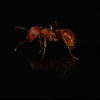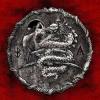What are your thoughts and experiences regarding this paper? What stood out to me was their conclusions:
(i) restriction to high-protein, low-carbohydrate diets decreased worker lifespan by up to 10-fold;
(ii) reduction in lifespan on such diets was mainly due to elevated intake of protein rather than lack of carbohydrate; and
(iii) only one day of exposure to a high-protein diet had dire consequences for workers and the colony, reducing population size by more than 20 per cent.
Are natural protein sources comparable to the casein and whey used in this paper? What is the average carb content of insects?

















